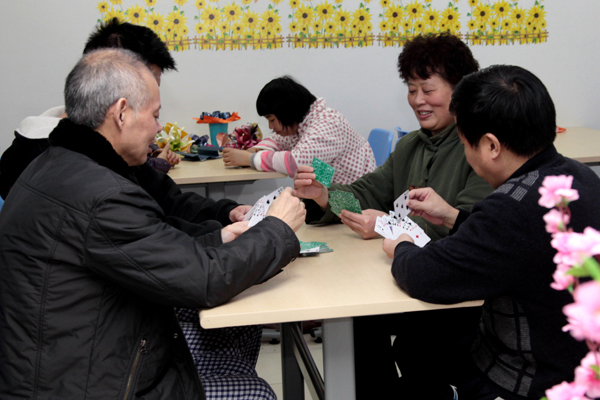Battling the scourge of depression
 |
|
Patients play cards. [Photo provided to China Daily] |
Other high-risk factors include malfunctions in certain nerve centers and a change in the level of hormones in the body. However, the most noticeable causes are the psychological impacts that result from traumatic incidents such as the death of a spouse, divorce, unemployment and serious physical disease, according to Zhang.
"Depression not only affects mood, it also results in physical conditions such as loss of appetite, sleep disorders, lack of sexual desire and constant symptoms such as headaches and shortness of breath," he added.
"It's possible that patients can be cured without intervention, but the symptoms can worsen if not treated properly, and that can result in serious consequences, such as suicide."
Support services lacking
Du, from the Beijing Huilongguan Hospital, said that while many patients receive psychological counseling, medication is also necessary for those with serious depression.
In addition to a lack of diagnosis and treatment, a shortage of support services mean patients face major dilemmas when they are sent back to their communities or homes to recover. "Patients with depression should not stay in big hospitals for too long," she said.
Instead, patients are encouraged to recover within their communities and at home, where they can have more social interaction. The approach can be successful, but sometimes support services are lacking.
"Many communities don't have any psychiatrists, or they lack nurses trained to deal with mental health issues. It is not feasible for doctors at big hospitals, who are already extremely busy coping with their own patients, to go into communities regularly to take care of patients," Du said.
Xie Bin, a mental health expert at the Shanghai Mental Health Center, said China faces a shortage of psychiatrists, given the large number of people with mental health issues.
Figures released by the National Health and Family Planning Commission show that there were 27,000 qualified psychiatrists in China at the end of 2015.
However, more than 40,000 psychiatrists are needed to meet the basic demand, according to Xie, and as few universities in China provide majors in fields such as clinical psychology there is a marked scarcity of talent.
"In this area, we need to learn more from developed countries to cultivate specialists," he said. "The government also needs to formulate favorable polices to import such talent from overseas."
Tolerance, understanding
According to Du, in addition to the lack of trained professionals, many people have scant knowledge of depression, and show little understanding of their family members, which can result in patients visiting hospitals repeatedly.
"How can a patient recover if he or she returns to their family after treatment, living in the same environment that caused the illness?" she said. "Family members should be more tolerant and understanding and care more about relatives with depression, rather than complaining about them."
Mo, the university teacher who has depression, said patients need strong family support. "Many people develop depression because of the people they are closest to, so all family members should take part in the treatment," he said.
According to Du, women experiencing painful periods, pregnancy or have recently given birth are more likely to suffer from depression, and one possible cause may be a sudden change in the level of hormones in their systems.
"We receive a lot of mothers with depression who have just given birth at the Beijing Obstetrics and Gynecology Hospital. Women in such situations require more attention and understanding from their family members," she said.
Contact the writer at [email protected]

























